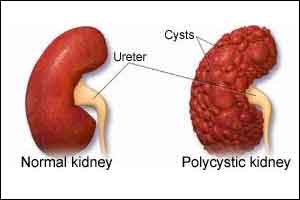- Home
- Editorial
- News
- Practice Guidelines
- Anesthesiology Guidelines
- Cancer Guidelines
- Cardiac Sciences Guidelines
- Critical Care Guidelines
- Dentistry Guidelines
- Dermatology Guidelines
- Diabetes and Endo Guidelines
- Diagnostics Guidelines
- ENT Guidelines
- Featured Practice Guidelines
- Gastroenterology Guidelines
- Geriatrics Guidelines
- Medicine Guidelines
- Nephrology Guidelines
- Neurosciences Guidelines
- Obs and Gynae Guidelines
- Ophthalmology Guidelines
- Orthopaedics Guidelines
- Paediatrics Guidelines
- Psychiatry Guidelines
- Pulmonology Guidelines
- Radiology Guidelines
- Surgery Guidelines
- Urology Guidelines
Stroke risk higher in patients of Renal cysts

The findings of a preliminary research, Rotterdam Study presented at the American Stroke Association's International Stroke Conference 2018 have concluded that Renal Cysts indicate a concomitant blood vessel damage in the brain and therefore a heightened risk of stroke.
Renal cysts (sacs of fluid in the kidneys) are common in older people and usually cause no symptoms. The cysts are often discovered when an ultrasound or CT scan is done for another purpose. Traditionally, renal cysts are regarded as benign kidney structural changes. Recent research suggests that renal cysts might represent an early stage of kidney damage. Since the kidney and brain have similar vascular anatomy and physiology, researchers wondered whether they might also signal blood vessel damage in the brain circulation and a heightened risk of stroke.
In a study of 2,984 people (average age 72 years, 57 percent female) from the general population in Rotterdam, the Netherlands, who underwent a kidney ultrasound, researchers examined medical records and found:
- stroke prevalence was 1.63 times higher in people with a single renal cyst (found in 17 percent of participants) compared to no cysts;
- stroke prevalence was even higher (2.14 times higher risk) in those with multiple renal cysts (found in 6.6 percent of participants) compared to those without cysts; and
- the associations were independent of other stroke risk factors such as high blood pressure, diabetes and age.
The Rotterdam Study is funded by Erasmus Medical Center and Erasmus University, Rotterdam, Netherlands Organization for the Health Research and Development (ZonMw), the Research Institute for Diseases in the Elderly (RIDE), the Ministry of Education, Culture and Science, the Ministry for Health, Welfare and Sports, the European Commission (DG XII), and the Municipality of Rotterdam.
Sanaz Sedaghat, Ph.D., Erasmus University Medical Center, Rotterdam, The Netherlands.

Disclaimer: This site is primarily intended for healthcare professionals. Any content/information on this website does not replace the advice of medical and/or health professionals and should not be construed as medical/diagnostic advice/endorsement or prescription. Use of this site is subject to our terms of use, privacy policy, advertisement policy. © 2020 Minerva Medical Treatment Pvt Ltd